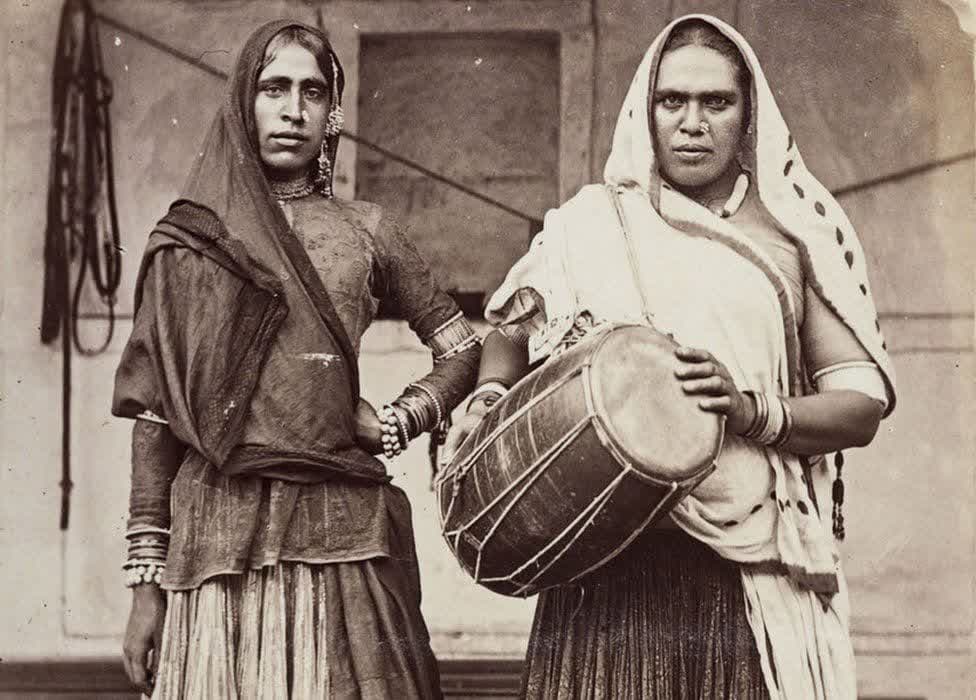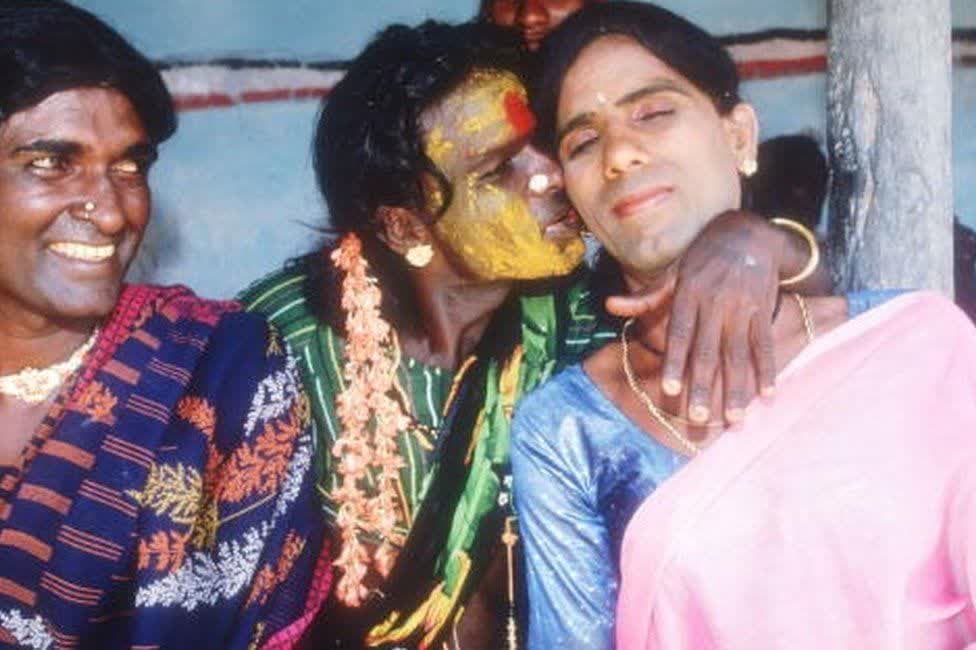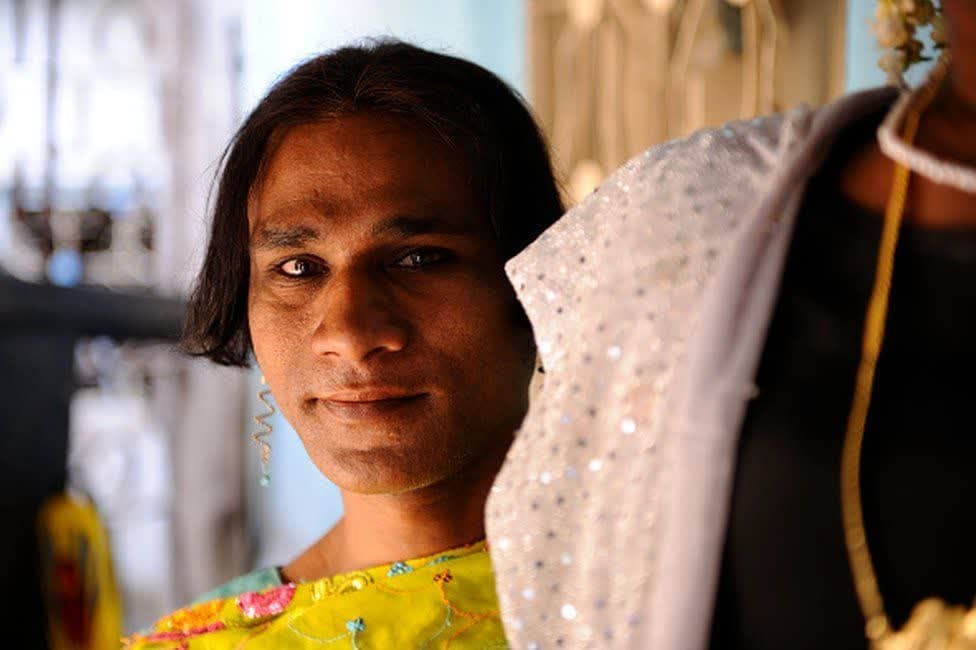Introduction
Eunuchs are historically referred to as individuals who, due to a combination of biological factors, did not develop secondary sexual characteristics, such as facial hair, a deepened voice, or breast development, during puberty. This condition is often associated with hormonal imbalances, genetic variations, or certain medical conditions that affect the production or response to sex hormones. It’s important to note that the term “eunuch” is considered outdated and can be stigmatizing. The eunuchs above discussed are the natural eunuchs. There are other eunuchs who are not by birth like that rather they are men who have been castrated in the past especially to guard women. In this article, our focus is on the natural eunuchs as if their speech style is natural or is determined by their social behavior.
Table of Contents
Eunuchs In Mughal Empire
Eunuchs are living in all parts of the world with their limited culture, rituals, and identities. The history of the subcontinent has witnessed the strength of eunuchs. Especially under the Mughal Empire, they enjoyed great power, and were named “Khawjasaras”. The fall of the Mughal Empire also resulted in the fall of eunuchs. With the passage of time, their role in society is restrained to dancing and begging in different ceremonies, rituals, and fairs. Their status is reduced to such an extent that they are now considered social outcasts and freaks. Now Pakistan and India have large groups of eunuchs’ communities and they are dispersed into family units, living in ghettos, and are usually ruled by a leader. It is not their own choice to be like the one they are but are unfortunately treated worse than the untouchables. They have become something to be feared. The main purpose of this article is to break this taboo while focusing on their style of speech.

Eunuchs In Art And Literature
If we talk about gender studies in sociolinguistics, we find that the theorists talk about two different sexes- male and female. But the question is, where do the eunuchs lie? What about the speech style of those who cannot be categorized in the “male” or the “female” category? Tannen in 1990 reveals a very different conversational style by men and women. She introduces the terms “report” and “rapport” in conversation. She reveals that women use conversation to make connections and establish intimacy, she calls this style of speech a rapport style of speech. Men on the other hand are associated with the report style of speech and see conversation as a means of establishing status and power. Talking about factual information or the “report talk” is one way to achieve higher status in conversation. This article intends to uncover the truth behind the speech style of eunuchs. It will explore whether they go for report style or the rapport style or their speech style is a mixture of these two. This article will also cover some of the social factors that influence the speech style of eunuchs. In sociolinguistics, in the area of gender and language, difference theory is a theory that highlights the effect of gender on the use of language. A main advocate of the theory is sociolinguist Deborah Tannen, whose work, especially her book “You Just Don’t Understand! Women and Men in Conversation”, is often cited in the discussion of the theory and is considered to be the main reason for its popularity.
Jennifer Coates, one of the sociolinguists, also talks about the area of language and gender. She gives a theory that girls and boys develop different styles of speech because they interact differently in their friend groups. It has been observed that the peer group of a child is directly influential upon their social linguistic development, and gender is the main principle with girls being encouraged to be typical ‘girls’ and ‘boys’ being encouraged to be typical ‘boys’. Applying this theory we will explore how eunuchs develop their particular kind of behavior, either they are taught to speak in a particular way since childhood or they speak in this way naturally.
Analysis Of The Speech Style Of Eunuchs
Interviews are employed as a tool to conduct this research. 6 eunuchs are being interviewed in their dera( the place where they live) in the Banni area in Rawalpindi, Pakistan. Only two of the eunuchs allowed us to make their videos and the rest of the 4 eunuchs were interviewed but were reluctant to record their interviews, so all we could do is to jot down whatever they said. In order to conduct research on the factors involved in the speech style of eunuchs, different questions were asked of the eunuchs related to their personal relationships, their upbringing, and their social background, and in doing so their way of speech was also been examined.
Descriptive Analysis
Question number 1 was asked from eunuchs if they feel othered or not and if yes, how often? The answers show that they are too much othered and their family also others them. They say that people know us that we are KHWAJA SARA and they openly mock us, and we are used to this thing and we cannot do anything because we know that there are no rights for us.
The second question asked them if they had ever gone through an identity crisis or not and their answer revealed that sometimes in some cases they do face problems regarding their identity. They are not allowed to go to Saudi Arabia to perform pilgrimage or any religious practice. The Saudi government does not allow them to enter their country. They told the reason for this and that is in their National Identity Cards the term KHWAJA SARA is written with their names.
The next question was asked to name the spheres of life in which they feel themselves othered. They named the event of marriage where they are invited but not as other guests but just for the purpose of entertainment, for dancing and singing. They are not looked upon as respectable beings and everyone laughs at them.
The above questions were asked by eunuchs to know about their definition of life, their feelings, and their perspective of life in order to relate their feelings, state of emotions, mind, and heart with their style of speech. The answers gathered from these questions reveal that they are more sensitive creatures and their circumstances made them more soft-hearted and emotional so they tend to behave more like women and their style of speech would be according to women.
.Question number four was asked from eunuchs to know if they need to adjust their speech style according to the context or not. The results gathered from their answers show that they do not have to do this obviously. Everyone knows their speech style so in every place they go with their own speech style.
Question number five was asked to know that through style of speech, the eunuch tries to establish intimacy or assert power. The answers reveal that they talk to establish intimacy. Even if they are angry, they choose to talk in a polite way.
Question number six was to know the effect of speech style on the personal relationships of eunuchs and the answers revealed that the speech style of eunuchs does not affect their personal relationships.
Question number seven was about the subject of discussion of eunuchs among friends. The answers reveal that among friends, they mostly talk about their family members. Sometimes they feel sad and discuss it with each other and why people laugh at them.
Question number eight was asked from eunuchs to know that when it comes to arguments, do they tend to compromise or make conflict. The results show that sometimes they argue with each other but their fighting is not like fighting with hands or harsh arguments. They clap their hands to show their anger.
Question number nine was asked to know from eunuchs to know either they give orders or proposals. The answers reveal that they prefer to give proposals.
Lastly, eunuchs were asked to give any suggestion to linguists. Eunuchs requested the linguists to give them importance and respect and give them some respectable jobs. They said that we too are human beings and we have the right to live a respectable life.
The above questions were asked from eunuchs keeping in mind the different kinds of contrasts proposed by Tannnen for the speech style of men and women. Applying these contrasts to the speech style of eunuchs, we come to know that from intimacy and power, they choose to establish intimacy in their speech style. They speak mostly to give advice and proposals rather than orders. When it comes to status and support, they speak both for establishing status and having support. They do not gossip too much like women. However, their subject of discussion is mostly their family and relationships which is more likely associated with women. From the above interpretation and answers, it is clear that the speech style of eunuchs is more like that of women. They also admit this as they said in the answer to the question which asks them where they categorize themselves when it comes to the speech style of men and women. Do they talk like men or women? Their answers show that their speech style mostly matches with women’s speech style. They used to talk softly and politely within their community and outside too. Their language is very soft and kind but sometimes they make their speech style like that of men.

Findings
While conducting this research about the speech style of eunuchs, two research questions were kept in mind, one was about the factors that give rise to the speech style of eunuchs and the other was about the role of gender in shaping the speech style of eunuchs.
The first question is based on the theory given by Tannen. She proposed different contrasts related to men’s and women’s speech and we apply the same contrasts to eunuchs’ speech to see which side they choose and what makes them speak in that particular way. Following is the tabular form of the findings.
| Men | Women |
| ✔ Status | ✔ Support |
| Independence | ✔ Intimacy |
| Orders | ✔ Proposals |
| ✔ Conflict | ✔ Compromise |
Tannen proposed that while speaking, men go for status, order independence, and conflict, whereas women try to establish intimacy, support, proposals, and compromise. In the case of eunuchs, they mostly go for the speech of style associated with women i-e support, intimacy, proposals, and compromise. However, two of the elements of men’s speech style are also present in them which is the style to establish status and make conflicts.
Conclusion
The basic purpose of the study was to study the speech style of eunuchs and explore the factors responsible for their style of speech and the role of gender in shaping the speech style of eunuchs. It has been observed that there are a number of factors that give rise to the speech style of eunuchs which includes their harsh circumstances and the indifferent behavior of the people towards them. Their exclusion from their own home as a child and then pleasing and entertaining everyone with singing and dancing and being bullied in return makes them so sensitive and emotional that they tend to behave more like women. In this way their style of speech is also like that of women however they do not talk exactly like women but are a mixture of men’s and women’s styles of speech with more feminine elements. Eunuchs try to establish intimacy in their style of speech, they mostly talk to have the support of others, and they mostly give pieces of advice, and proposals and go for compromise. However, like men, they also try to establish status and make conflicts when they speak. Just as gender theorist Judith Butler has pointed out, the definition of gender is a social or cultural complex and context-specific system for producing identities and ideologies. The culture and the context in which eunuchs are living, and the way they are being treated play a vital role in shaping their identity and their way of speech.

